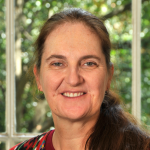Our Research Low cost water testing and disinfection

(a) UV range most lethal to microbes and (b) effect of UV radiation on microbial DNA structure (Picture Credits : Lisa F. Timmermann et. al. Evaluation of a mobile lightweight system, Travel Medicine and Infectious Disease)

ECC Vial test kit in action (Picture Credits: Murcott Research Team)

Conceptual rendering of a water tank lid with UV-C LEDs (Picture Credits: Murcott Research Team)
Principal Investigator
Susan Murcott
- Lecturer
- MIT D-Lab
Susan Murcott is an entrepreneur, innovator and lecturer at MIT. She has held various research and teaching positions in the Civil and Environmental Engineering Department, the Department of Urban Studies and Planning and today is based at MIT D-Lab, a program that advances collaborative approaches and practical solutions to global poverty. She has an impressive record of mentoring students in designing simple solutions for low-income communities as well as in humanitarian disaster settings. She is the co-PI, with Jeff Ravel, of the 2018-2020 project “Manufacturing and Marketing an E.coli Test Kit in Nepal” with support from MIT J-WAFs.
Challenge:
Can we disinfect drinking water at a low cost in rural and resource-constrained environments?
Research Strategy
- Facilitate a better understanding of existing drinking water quality using the E. coli and total coliform (ECC) Vial, a low-cost test for fecal contamination in water
- Design and develop a low-cost UV-C based water disinfection unit for usage in residential schools in rural parts of India
- Test the efficacy of the designed UV-C device and develop a scale up plan
Project description
In India, waterborne diseases affect approximately 38 million people every year and over 1.5 million children die due to waterborne diseases like diarrhea. Waterborne illnesses disproportionately affect people living below the poverty index and those who live in rural areas that don’t receive water and sanitation resources from the central Indian government. This project focuses the implementation of a solution in a specific district: West Singhbhum in the state of Jharkhand in eastern India. Despite being endowed with abundant natural resources, approximately 40% of the population of Jharkhand lives below the poverty line and away from water and sanitation services.
MIT researchers, supported by a J-WAFS Grant for Water and Food Projects in India, are working with state agencies in West Singhbhum to design and pilot a water treatment solution for 20 government-run residential schools for girls where a total of 8,000 students live. The treatment systems will filter water, test for microbiological contamination, and communicate test results and alerts to local leaders. They will apply the simple, low-cost, and reliable E. coli test developed by project lead Susan Murcott of MIT’s D-Lab and supported by two J-WAFS Solutions grants, and will add novel UV-based water disinfection technology to create systems that supply clean water to each school building. The UV-C disinfection technology uses short wave ultraviolet (UV) radiations of wavelength 100-300 nanometers (nm) that has a strong germicidal effect against bacteria and viruses. These organisms are inactivated once a sufficiently lethal dose of UV light has been absorbed, altering the molecular structure, preventing reproduction, and thus rendering the microorganisms harmless to humans. UV-C disinfection is affordable, accessible in resource-constrained areas, and low maintenance, which makes it desirable for places such as Jharkhand, India. Coupled with the ECC Vial technology, the UV-C device will provide a complete testing and disinfection solution for drinking water. The team will collaborate with Aditya Ranjan, a state administrator in Jharkhand who has led water quality and healthcare education initiatives in the region, to officiate an on-the-ground pilot in 2021.
MIT researchers driving this project under the supervision of Susan Murcott are Ankita Singh and Deborah Go, both MBA and SM degree candidates in the Sloan School of Management and the Department of Mechanical Engineering.
Outcomes
- Developed and demonstrated the ECC Vial product after 2 years of lab and field-based research
- Conducted a successful business launch of the ECC Vial product to a wide spectrum of government water agencies, private water vendors, water businesses and NGOs in Kathmandu Nepal in Jan. 2020
News
Additional Details
Impact Areas
- Water
Research Themes
- Water Purification & Desalination
- Sensors & Monitoring
- Equity & Access
Year Funded
- 2020
Grant Type
- India Grant
Status
- Completed

